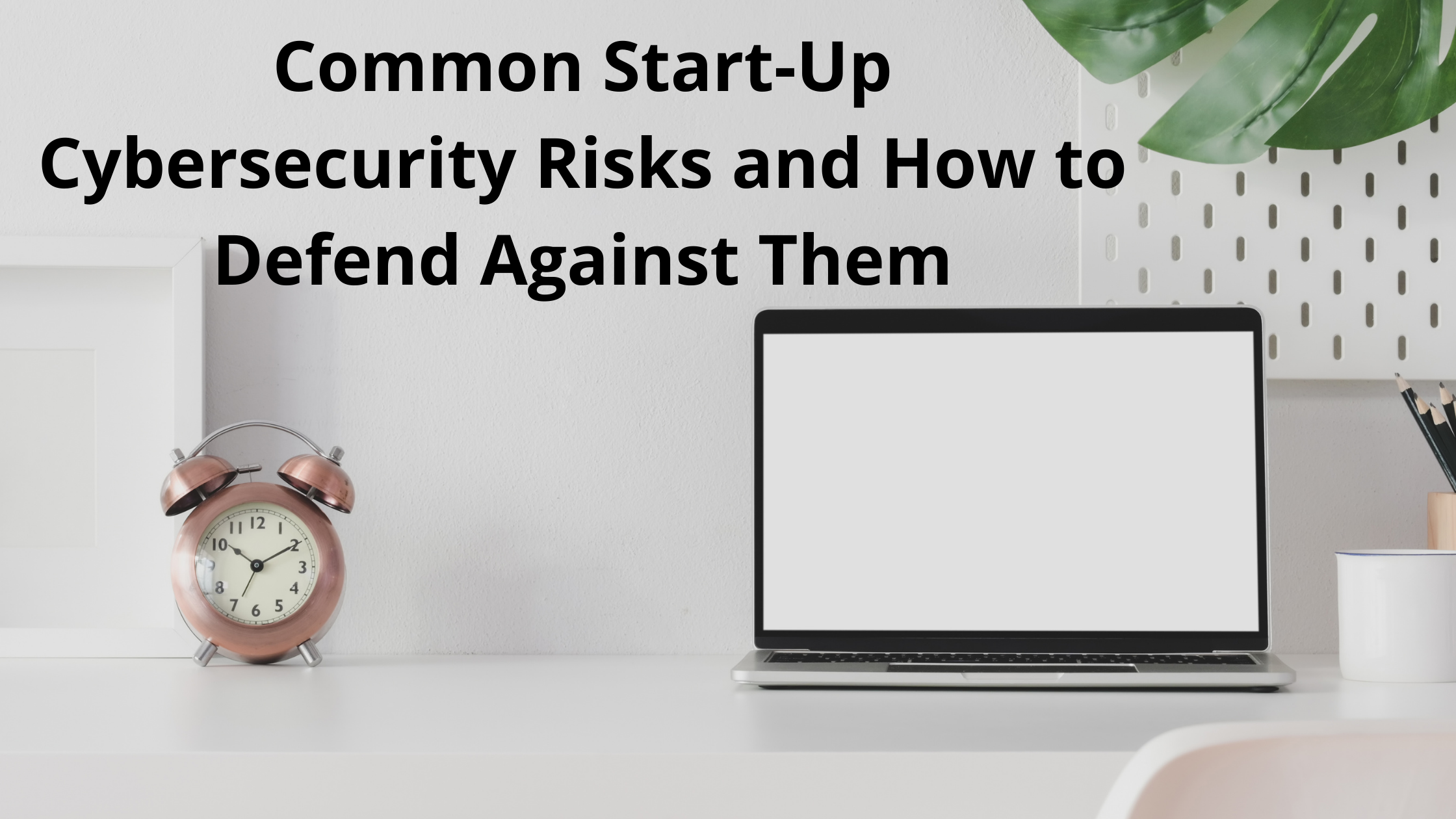
Common Start-Up Cybersecurity Risks and How to Defend Against Them
Over the past few years, the risk and severity of cyberattacks and data breaches have grown tremendously. Thanks to advances in technology and the widespread adoption of digital media, these attacks are getting smarter by the day. In the last five years, humankind has paid witness to some of the most horrific incidents of cybercrime ranging from massive data breaches to AI-enhanced attacks, ransomware, and social engineering attacks. While individuals can also fall victim, most of these attacks target businesses.
The large corporations may hog the headlines, but small businesses remain the silent majority when it comes to data breaches and cyberattacks. Reports show that 43% of cyberattacks target Small and Medium-Sized Businesses (SMBs). Start-ups, in particular, are vulnerable to cyberattacks, often with catastrophic consequences. Scroll down to learn how to protect your start-up against the ever-rising threat of cybercrime.
Why Start-Ups?
According to the World Economic Forum’s 2019 Global Risk Report, data breaches and cyber threats are among the top five most serious risks businesses around the world are facing. Every business, regardless of size, has vulnerabilities that hackers could exploit. However, start-ups and other small businesses are more vulnerable to cyberattacks than their large and established counterparts. Why’s that? Well, for starters, most start-ups lack the strong encryption technology required to keep data safe online.
Often, start-ups have a treasure trove of data that cybercriminals would love to exploit. These include customer information such as credit card number, social security number, email address, contact information, etc. Due to weak or non-existent cybersecurity, cybercriminals can steal this information and use it to run financial scams on unsuspecting users. The lack of a robust cybersecurity infrastructure makes start-ups a favorite target for hackers. It’s a low-hanging fruit that hackers just can’t resist.
Cybersecurity Risks Facing Start-Ups
Start-ups are an attractive target for cybercriminals because they tend to have weak computer security. The general lack of preparedness increases the likelihood of being hit with a potentially devastating cyberattack. One of the most important steps you can take towards protecting your start-up is familiarizing yourself with the different types of cybersecurity risks out there. You can’t defend against what you don’t know. Here are some of the most common cyber threats start-ups face.
Data Breaches
There are many ways hackers can use to steal your start-up’s valuable data. Incidents of data breaches targeting start-ups are becoming increasingly common. Common risks include Man-in-the-Middle (MITM) attacks where a hacker intercepts data on a fake page when connecting to the internet on public or unsecured Wi-Fi networks, stolen passwords, and social engineering attacks such as phishing and spear phishing.
Ransomware Attacks
Malware is one of the most common types of malicious online activity. Hackers can deploy malware to your system and cripple the entire security system or render it useless. There are many types of malware out there but ransomware is becoming increasingly common these days. Small businesses are commonly targeted by ransomware. Forbes predicted a 300% increase in ransomware attacks in 2020, mostly targeting small businesses.
Social Engineering Attacks
Social engineering scams pose a huge cybersecurity threat for start-ups and other internet-based SMBs. Phishing, a common social engineering tactic, uses disguised email to access and steal user data. A 2019 Internet Security Threat Report by Symantec shows that staff members in small businesses have a higher likelihood of being targeted with email threats such as spam, phishing, and email malware compared to their counterparts working in large, established organizations.
The Cost of Cybercrime
For big businesses, a cyberattack or data breach is probably no more than an expensive nuisance whereas the same can have potentially devastating consequences for a start-up. The average loss per attack per business is approximately $200,000, not to mention the reputational damage and potential lawsuits. Now that’s a lot of money for small businesses, more than enough to run a young start-up into the ground. Reports indicate that 60 percent of SMBs go under the first six months after a cyberattack.
Secure Your Start-Up
Cybersecurity threats such as phishing, AI-enhanced attacks, ransomware, etc. can have potentially devastating effects on SMBs and tech-driven start-ups. Starts-ups lack the resources to bounce back after an attack and as stated earlier in the article, 60 percent of them will go under six months after an attack. Luckily, there are ways to plan for a cyberattack and mitigate the damage. Here are some proactive steps you can take to defend your start-up against cyberattacks.
Risk Assessment
A risk assessment will help you identify, quantify, and prioritize the risks and vulnerabilities in your system. This exercise helps you identify the various information assets that could be compromised in the event of a cyberattack. These include intellectual property, customer data, laptops, systems, and hardware. You will also be able to identify, analyze, and evaluate the various threats that could compromise these assets. This process will help you ensure that your cybersecurity safeguards are appropriate for the risks your start-up faces.
Access Control
Today, the vast majority of cyberattacks are directed at the employees’ lack of awareness instead of vulnerabilities in the system. It’s safe to say that employees are the biggest cyber threats for your business. Therefore, employee access to company data should be limited. Start-ups should also restrict employee authority to install and uninstall applications on company devices to reduce the risk of malware.
Backup Your Data
As a start-up entrepreneur, you should make sure that sensitive company data is properly backed up in the cloud. Backing up your data is important during a time when ransomware and other types of malicious attacks targeting company data are on the rise. A data backup gives you the chance to wipe off all your data when you detect a ransomware attack and start afresh. If you are serious about protecting your start-up’s sensitive data from these threats, make sure that you have this security measure in place.
Hire IT Experts
Start-ups and other small businesses are often targeted by hackers due to their lack of experience in dealing with cyberattacks and the tendency to use outdated software. Outsourcing cybersecurity to a company that specializes in IT security provides a convenient and reliable way to protect your company’s data. Start-up entrepreneurs who don’t have the resources to optimize their business for cybersecurity can greatly benefit from this type of arrangement. This way, you get to focus on growing your business and other urgent issues.
Employee Training
As stated earlier in the article, a significant number of attacks target the human element within an organization. Training your staff on cybersecurity best practices has never been more important. Provide regular employee training on cybersecurity best practices to help develop a proper cybersecurity culture in your organization. Teach your employees habits that prevent an internal breach, such as keeping their passwords private, and how to recognize spoofed or malicious emails.
Set Up an Incident Reporting Mechanism
Creating an efficient incident reporting mechanism within your start-up will help you ensure that no cybersecurity incidents go unreported. As a start-up entrepreneur, you should strive to ensure that all cybersecurity incidents are reported and well documented. With an efficient incident reporting mechanism in place, your IT security team puts proactive measures in place and improves your start-up’s level of preparedness against cybersecurity attacks.
Use a VPN
Many corporations use Virtual Private Networks (VPNs) to protect sensitive data, and you can do the same for your start-up. It is one of the most effective ways to guarantee privacy and anonymity online. VPNs are particularly important when connecting to public Wi-Fi networks to access your email, social media, etc. Using a VPN router for all connecting devices can help prevent DDoS attacks and provide an extra layer of protection against a wide range of online threats.
Install Antivirus Software
Sometimes referred to as antimalware, the term antivirus is used to describe a set of programs designed to protect your system from viruses, trojans, spyware, worms, and other malicious software. Antivirus software helps you protect your start-up’s data, company information, and identity. This software will also help you remove any glitches as well as unwanted programs that may be bogging down your computer system, improving security and performance.
Keep Your System Up-to-Date
Installing antivirus software won’t be much help if you don’t keep it up to date. Cyberattacks are constantly evolving, and so should your security. Always make sure that your cybersecurity software, applications, and firmware is up to date. Cybercriminals tend to take advantage of weaknesses in your system to access your devices. Check your cybersecurity systems regularly to make sure that you are running the latest versions and with the latest antivirus definitions. An up to date system is a secure system.
Final Words
With nearly half of cyberattacks targeting SMBs, cybersecurity is becoming a significant concern for start-ups. The complacency of start-up entrepreneurs towards cybersecurity is one of the biggest reasons these businesses are increasingly being targeted by cybercriminals. Your business is never too small to consider cybersecurity measures. Inevitably, threats like phishing and ransomware will continue to keep start-up entrepreneurs up at night. It’s imperative that you take proactive steps to defend your start-up against these threats.


No Comments